Iranian nuclear programme
All topics-
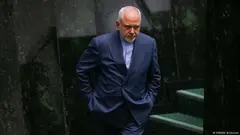 Power politics in Iran
Power politics in IranFallout from Mohammed Javad Zarif's political bombshell
An interview by Foreign Minister Mohammed Javad Zarif has provoked outrage in Iran. In it, Zarif criticised the Revolutionary Guards' destructive role in both the nuclear agreement and the Syrian war. Ali Sadrzadeh has the details
-
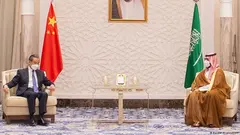 China in the Middle East
China in the Middle EastBeijing's new charm offensive
The last week in March saw China's Foreign Minister Wang Yi visit six countries in the Middle East: Saudi Arabia, Turkey, Iran, the United Arab Emirates, Oman and Bahrain. Two initiatives in particular are sending the clearest signal yet that China may be gearing up to play a greater political role in the Middle East. By James M. Dorsey
-
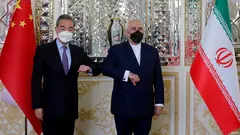 Iran-China 25-year Cooperation Programme
Iran-China 25-year Cooperation ProgrammeThe Islamic Republic's timely vaccine against U.S. pressure?
On 27 March, Iran and China signed a 25-year accord intended to foster "strategic co-operation". Despite ongoing uncertainty over the deal's actual scope, content and chances of realisation, the agreement has been hailed by Iranian officials as nothing less than a game-changer when it comes to securing the interests of the Islamic Republic. By Ali Fathollah-Nejad and Amin Naeni
-
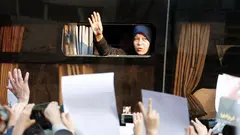 Iranian Faezeh Hashemi, Rafsanjani's daughter, speaks out
Iranian Faezeh Hashemi, Rafsanjani's daughter, speaks outWill the Islamic Republic ever get a female president?
Iran's social media was buzzing in January when, Faezeh Hashemi, daughter of Iran’s former President Rafsanjani gave a controversial interview, striking a chord with many Iranians. Questioning the merits of Tehran’s regional policy of "resistance" pursued by the late General Soleimani, Hashemi went on to assert that it will take sustained pressure to change the Islamic Republic’s policies. By Ali Fathollah-Nejad
-
 The Persian poetry of mathematics
The Persian poetry of mathematicsFrom Omar Khayyam to Mirzakhani – Iran’s beautiful minds
Presenting a more nuanced vision of their common homeland, Iran, to Western imaginations, kindred spirits Omar Khayyam and Maryam Mirzakhani stand out against the twenty-first century backdrop of anti-Iranian sentiment and Islamophobia. By Hamid Dabashi
-
 Charting the history of Iran sanctions
Charting the history of Iran sanctionsThe Islamic Republic's never-ending labour pains
The Islamic Republic of Iran has been subject to sanctions ever since its creation in 1979. The more the regime has entrenched itself and expanded its power in the region, the more sophisticated the sanctions have become, effectively crippling the country. Will they ever end? Ali Sadrzadeh traces their history
-
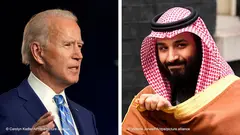 Saudi Arabia and the U.S.
Saudi Arabia and the U.S.MbS courts Joe Biden over Iran fears and the economy
After months out of the spotlight, Saudi Crown Prince Mohammed bin Salman has returned centre-stage with diplomatic and economic moves that diplomats say are aimed at showing the new U.S. president he is a valuable partner who can get things done
-
 Reconciliation between Saudi Arabia and Qatar
Reconciliation between Saudi Arabia and QatarA turning point for the whole Middle East?
Saudi Arabia and its allies have agreed to set aside their differences with Qatar at a summit meeting of the Gulf Cooperation Council. The restoration of diplomatic relations could have strategic resonance far beyond the Gulf nations and change the entire region. By Karim El-Gawhary
-
 U.S. foreign policy in the Arab world
U.S. foreign policy in the Arab worldJoe Biden and the Middle East – bid farewell to Trumpism
Recognising the shifting geopolitical priorities facing America and the Arab states, analyst Marwan Muasher cites three areas in which U.S. President-incumbent Joe Biden's Middle East policy is likely to differ from that of his predecessor Donald Trump
-
 Hic sunt dracones
Hic sunt draconesIs Iran set to forfeit its national interests to China?
A partnership planned between Iran and China is intended to strategically link the two countries for a quarter of a century. It is unclear, however, exactly what the alliance will entail and whether its lofty ambitions can indeed be fulfilled. Iranian politicians of almost every persuasion remain highly sceptical. By Ali Fathollah-Nejad
-
 First INSTEX transaction with Iran
First INSTEX transaction with IranTrade as an obstacle course
Germany and other member states of the European Union are for the first time making use of the so-called INSTEX mechanism to circumvent the sanctions imposed on Iran by the United States. By Birgit Svensson in Cairo
-
 U.S. foreign policy in the Middle East
U.S. foreign policy in the Middle EastSlave to the Trumpian impulse
Beyond the latest crisis with Iran, current U.S. Middle East policy is nothing if not chaotic. Many fear that the Trumpian approach could irreparably damage future U.S. administrations and international order as a result. By Stasa Salacanin
